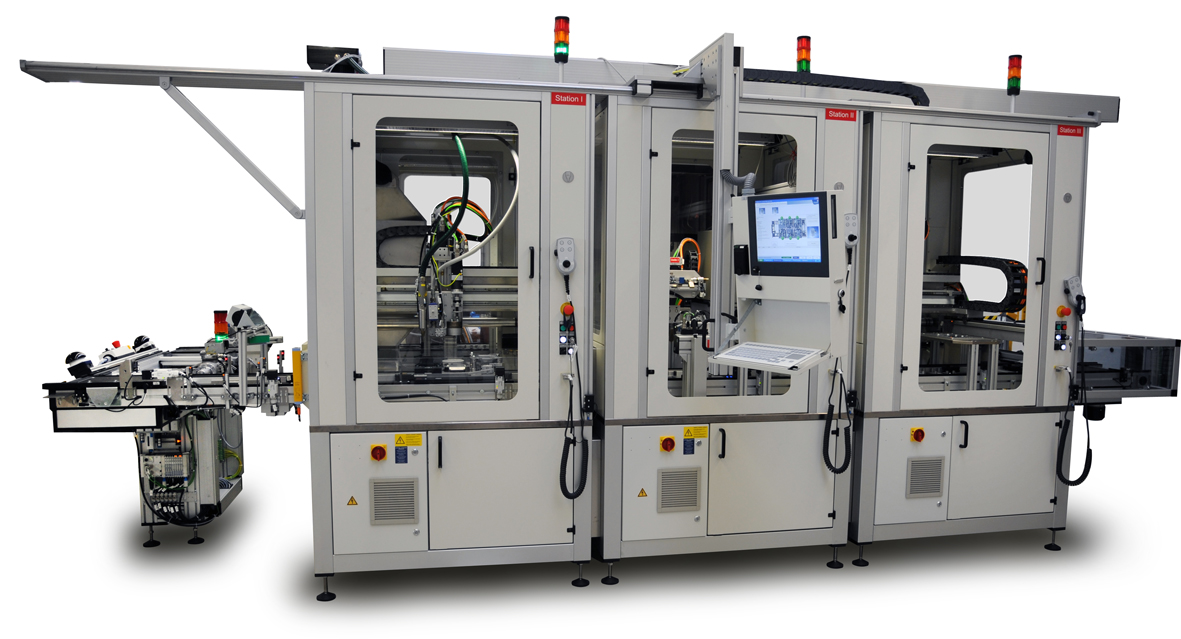Where poor quality can cost lives
Significantly larger numbers of sensors and ECUs are being installed in vehicles today. Since faults in this area can cost lives, the sensitive electronics must have lasting protection against damaging thermal, mechanical and chemical influences. This is where precise, high quality adhesive bonding, dispensing and potting processes come into play.
Sensors measure tire pressure and wheel speed, check the axle load and steering angle, and monitor the oil level, engine temperature and fuel level. More than 100 sensors are currently installed in a single modern vehicle – and this number is growing. Together with the associated ECUs, they help to keep the vehicle in the lane while driving, smooth out shifting in automatic transmissions and assist in reducing emissions, among other things. In short, they contribute to more safety, convenience, comfort and efficiency. However, this also means that faulty sensors, such as those related to the ESP or airbag, can also jeopardize lives. To make sure this doesn't happen, the electronics in the ECUs and sensors and the open contact points on the housing must be reliably and permanently shielded against damaging influences. This is possible using precise adhesive bonding, sealing and potting processes with repeat accuracy as well as selecting the right potting media.
Material selection: no material works for all purposes
The types of influences to which the sensors and ECUs in the vehicle are exposed can be seen by taking a look at the vehicle interior: Sensitive electronics are usually installed in the engine compartment, around the powertrain or in sensitive areas around the wheel axles or tank, which means that they have to overcome high temperatures, dirt, moisture and strong vibrations. There is also the risk that corrosive media such as oil, fuel or brake fluid could penetrate the adhesives, sealants and potting media used and cause the material to swell or come off. This illustrates the importance of accurately selecting the material to fit the application.
There is no one size fits all solution for which media are best suited for particular sensors. A wide variety of different properties come into play depending on the location, geometry and function of the sensor. For instance, potting compounds for parking distance sensors must have exceptional acoustic properties in addition to excellent mechanical features so that the ultrasonic signal is not distorted when transmitted. Sensors such as the TMAP sensor, which is located in the air intake passage and measures the intake air temperature and pressure, must be able to withstand major pressure changes, while other sensors must have a high resistance to corrosive chemicals. To ultimately ensure the devices can perform smoothly, it is important to work closely with the system and material manufacturers in the early stages of the project.
During preliminary materials and process testing, you can also test which medium fulfills the specific requirements, which potting method provides the best and at the same time most cost-effective results, and which cycle times can be achieved through its use. For these purposes, Scheugenpflug offers a professionally equipped Technology and Application Center, where even new dispensing materials and workpieces can be tested thoroughly before their market launch or batch production.
Example System
Example system for the application of sealing beads and highly filled thermally conductive adhesives onto the backs of heat sinks of control units and the efficient automation of different production steps.

Sensor potting: precision required for large batches
In light of the sharp rise in batch quantities and highly automated mass production, it is particularly important when potting automotive sensors to ensure that the potting results are precise and can be repeated with accuracy even in the case of high part throughput.
- Multi-piston dispensers by Scheugenpflug provide the ideal solution for effective sensor potting. Not only are they extremely precise, but they also always provide a consistent mixing ratio and high pot life thanks to their solid mechanical operation.
Dispensing and PRoduction Line
For automotive ECUs, precise and reliable sealing processes are particularly in demand in order to provide lasting protection to the electronics in the housings from damaging fluids and chemicals. In this case, sealing materials that also provide adhesion are used to bond the housing parts permanently to each other.
Ensuring precise sealing processes
- The Dos GP gear pump dispensers, which were designed specifically for continuous bead application, are particularly suited for dispensing these materials.
- For potting sensors and ECUs, Scheugenpflug provides the ability to integrate additional production processes such as handling, joining and quality assurance. This gives us the ability to provide you with a custom, perfectly tailored production line with the downstream and upstream processes you require.
TIP: Environmental factors often interact to reinforce each other in the vehicle. For example, an increased temperature usually accelerates the absorption of oil or fuel. Therefore, if possible, combined tests for the potting materials used should be conducted.

